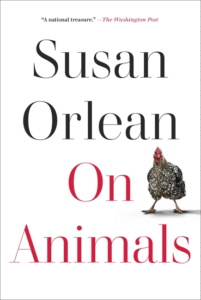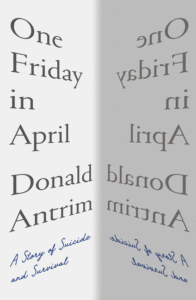
John le Carré’s Silverview, Hillary Clinton & Louise Penny’s State of Terror, Susan Orlean’s On Animals, and Donald Antrim’s One Friday in April all feature among the Best Reviewed Books of the Week.
1. Silverview by John le Carré
(Viking)
7 Rave • 11 Positive • 1 Mixed
“Le Carré favors the close third person, but every point of view has just enough opacity that readers can never be sure they’ve seen everything … Typically, le Carré’s narrative warheads are lodged in his endings. The novels patiently build up to a final explosion, leaving readers with a greater sense of dismay than of triumph. Endings, for le Carré, were reckonings. This slender volume (just over 200 pages) does conclude, rather abruptly, but it lacks what le Carré has taught us to expect of an ending. You can wonder, indeed, whether he had quite got around to finishing the book … if Silverview feels less than fully executed, its sense of moral ambivalence remains exquisitely calibrated. Besides, novelists of le Carré’s stature are not diminished by their lesser efforts; Henry James closed his career not with his masterly The Golden Bowl but the wanly schematic The Outcry. The Republic of Literature has room for both.”
–Joseph Finder (The New York Times Book Review)

2. Small Pleasures by Clare Chambers
(Custom House)
5 Rave • 2 Positive • 1 Mixed
Read an excerpt from Small Pleasures here
“This is a novel about women’s lives, and Chambers reveals their many and complex histories alongside Jean’s household tips, but in the same highly restrained tone. The effect is one of great authenticity, as Chambers exposes life experiences that belie the genteel tone of the novel while continuing to conform to it … The writing is so unassuming that it would be easy to miss how accomplished it is. Cliches are skilfully avoided and the atmosphere is richly portrayed … Small Pleasures is an unusual novel. A perfectly pitched period piece, with an intriguing mystery driving it and a deeply affecting love story at its heart, it’s also a novel about the messy truths of women’s lives and their courage in making the best of that mess.”
–Kathleen MacMahon (The Irish Times)
3. This Thing Between Us by Gus Moreno
(MCD x FSG Originals)
4 Rave • 2 Positive
Read Gus Moreno on the books that helped him cope with grief here
“Moreno emphatically plants his flag as an original new voice in cosmic horror … Readers will eagerly follow Thiago and the increasingly weird twists and turns that escalate from unsettlingly haunting to uncomfortably creepy, and ultimately arrive at mind-altering terror … Moreno has melded a thought-provoking novel about mourning with unapologetic horror, much like the very best of twenty-first-century cosmic horror.”
–Becky Spratford (Booklist)
4. State of Terror by Louise Penny and Hillary Clinton
(Simon & Schuster/St.Martin’s)
2 Rave • 4 Positive • 1 Mixed
“When politicians write novels, I usually try to avoid reviewing them … State of Terror is a big, turbocharged, breathtaking exception: It’s one of the best political thrillers I’ve ever read … what readers might hope for but not often get: a thriller that combines the firsthand, insider knowledge of a former Secretary of State with the writing skills of a master of suspense. Bonus feature: lots of wicked humor … (You might recall that Clinton’s husband, former President Bill Clinton, has written a couple of political thrillers with megabestselling author James Patterson. They’ve done yeoman work, but the ladies outshine them) … Every new discovery is more terrifying than the last, and what adds an extra layer of dread is that we know Clinton actually held this job. As each appalling detail emerged, I found myself wondering whether it had really happened … keeps up a relentless pace, with more twists and turns and cliffhangers than I could count. Yet unlike any other thriller character I can think of, Ellen doesn’t punch anyone or shoot anyone or throw anyone out of an airplane. With her, it’s all brain work.”
–Colette Bancroft (The Tampa Bay Times)
5. When Two Feathers Fell From the Sky by Margaret Verble
(Mariner Books)
3 Rave • 2 Positive • 1 Mixed
Read an excerpt from When Two Feathers Fell From the Sky here
“It’s not a perfect novel, but at its best, it’s a gripping one … while the novel can seem unfocused at times, Verble makes up for it with her real narrative skill. Her occasional peregrinations aside, the book moves quickly, and she manages to stick the landing thanks to a few clever plot twists … Verble’s characters are mostly memorable ones, particularly Two. It’s difficult to pull off an original version of the tough-but-vulnerable archetype, but Verble does it quite well, giving the young woman a real personality that comes through in her terse but tender dialogue. Crawford, too, is a fascinating character, though the reader is left wishing he’d figured into the novel a little more. And the chapters featuring Little Elk are executed with real finesse; while having a character who’s a ghost can come off as gimmicky, Verble plays it with a straight face, and the gambit works … isn’t without its flaws, but it’s a compelling novel from an author who writes with sensitivity and compassion. For readers with an interest in 20th-century American history, it’s certainly a ride worth taking.”
–Michael Schaub (NPR)
**

1. On Animals by Susan Orlean
(Avid Reader Press)
8 Rave • 3 Positive • 1 Mixed
Read an interview with Susan Orlean here
“I very much enjoyed Orlean’s perspective in these original, perceptive, and clever essays showcasing the sometimes strange, sometimes sick, sometimes tender relationships between people and animals … whether Orlean is writing about one couple’s quest to find their lost dog, the lives of working donkeys of the Fez medina in Morocco, or a man who rescues lions (and happily allows even full grown males to gently chew his head), her pages are crammed with quirky characters, telling details, and flabbergasting facts … Readers will find these pages full of astonishments … Orlean excels as a reporter…Such thorough reporting made me long for updates on some of these stories … But even this criticism only testifies to the delight of each of the urbane and vivid stories in this collection. Even though Orlean claims the animals she writes about remain enigmas, she makes us care about their fates. Readers will continue to think about these dogs and donkeys, tigers and lions, chickens and pigeons long after we close the book’s covers. I hope most of them are still well.”
–Sy Montgomery (The Boston Globe)

=2. One Friday in April: A Story of Suicide and Survival by Donald Antrim
(W. W. Norton)
6 Rave • 1 Positive
Read an interview with Donald Antrim here
“… [an[ engrossing, necessary book … this is not an empirical study. Rather, it is intimate testimony from someone who has lived through an illness long shrouded in silence, shame and sin. Antrim speaks with the moral authority of the survivor … Antrim’s inventive, circular prose style reflects his sense of warped time: Hours bend, fragment, compress, extend. The narrative catapults forward, then backward—a kind of chronological whiplash that dislocates us in time and place … Just when we start to put the pieces of Antrim’s life together, he wrenches us away from the relief of comprehension. The medium is the message: Suicide, as Antrim understands it, is a continuum of emotional pain … One hopes this brief, courageous book will bring us closer to the ‘paradigm shift’ Antrim seeks—a reckoning that could bring about better funding for mental health research, more affordable psychiatric beds and less societal stigma.”
–Heather Clark (The New York Times)
=2. Concepcion: An Immigrant Family’s Fortunes by Albert Samaha
(Riverhead)
6 Rave • 1 Positive
“… a sprawling and impressive work … Starting with how Spanish colonialism knocked Samaha’s ancestors out of royalty, the book’s historical retellings span hundreds of years and ultimately result in a scathing indictment of America’s role in shaping the modern history of the Philippines … Samaha, an investigative journalist, unearths a wealth of documentation that runs counter to the kinder, gentler version of American history we’re taught in school … especially timely, reminding us of the promises America fails to keep.”
–Leland Cheuk (The San Francisco Chronicle)
4. Oscar Wilde: A Life by Matthew Sturgis
(Knopf)
4 Rave • 5 Positive • 2 Mixed • 1 Pan
“Tragedies make the best stories, and Matthew Sturgis makes the most of Wilde’s in his new biography … Sturgis’ clear-eyed understanding of Wilde is acute, his narrative assured. Drawing on new material, including the full transcript of the libel trial that set Wilde on the path to prison, he assembles an indelible portrait of a confounding and complex man … Sturgis captures Wilde’s contradictions: generous but erratically cruel, brilliant but careless. He doesn’t fully analyze Wilde’s wanton streak, but the evidence is abundant: Wilde opined that ‘nothing is good in moderation’.”
–Mary Ann Gwinn (The Star Tribune)
5. Those We Throw Away Are Diamonds: A Refugee’s Search for Home by Mondiant Dogon
(Penguin)
4 Rave • 1 Positive
Read an excerpt from Those We Throw Away here
“Notwithstanding the brutality he describes, Dogon’s tale possesses a beguiling delicacy. We never lose sight of his humanity, even if he often doubts it himself … As he reminds himself, for every neighbor who used the post-genocide turmoil as an opportunity to loot and rape, there was a local villager, a stranger on the road, who warned his family members of approaching danger, hid them at great personal risk and treated their wounds. Scrupulously recorded, these are the moments that restore his—and his readers’—faith in mankin … This book beautifully captures the colossal waste that the refugee experience—essentially a state of suspended animation—represents … Dogon’s own story closes with a possibility of Rwandan citizenship, but it is far from assured. Reality rarely offers the neatness of happy endings. Flotsam and jetsam of the modern world, refugees are engaged in a dogged battle to endow a modicum of dignity to lives over which they exert almost no control. Dogon rises to that challenge far better than most of us would.”
–Michela Wrong (The New York Times Book Review)

